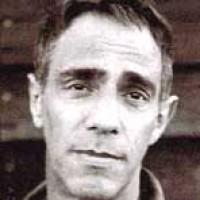Derek Jarman
31.01.1942, Nortwood, Velika Britanija - 19.02.1994, London, Velika Britanija

1942. His real name was Michael Jarman. He was educated at the King's College
(London) where he graduated in history and art. From 1963 till 1967 he studied
painting at the Slade School in London. In the early seventies he started
working on stage design for films The Devils (1971) and Savage Messiah
(1972) by Ken Russell. He shot numerous short films mostly on Super 8. In 1976
he shot his first motion picture Sebastiane. In the next twenty years
Jarman often interwove historical evocations with unexpected anachronisms,
particularly in his biographical films Caravaggio (1986) and
Wittgenstein (1993). His most important 'non-talking' films of the '80s
The Angelic Conversation (1985) and The Last of England (1987), are
marked by his artistic emotion. Homosexuality, the ever-present theme in his
films, is most prominent in the '90s films The Garden (1990), Edward
II (1992) and his last film Blue (1993). Derek Jarman died of AIDS in
London on February 19, 1994.
Filmography
Blue (1993)
Wittgenstein (1993)
Edward II (1992)
The Garden (1990)
War Requiem (1988)
Aria dio Depuis le jour (1987)
The Last of England (1987)
Caravaggio (1986)
The Angelic Conversation (1985)
In the Shadow of the Sun (1980)
The Tempest (1979)
Jubilee (1978)
Sebastiane (1976)